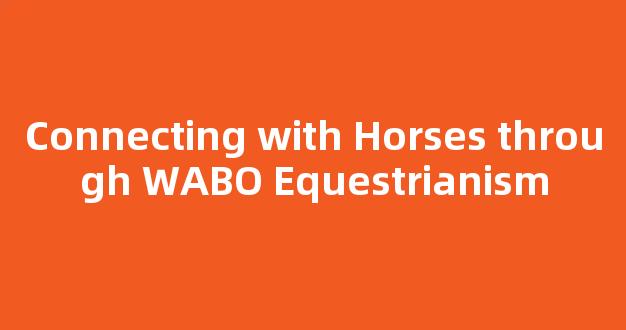Connecting with Horses through WABO Equestrianism: A Holistic Approach to Equine Bonding
Horses have long been revered for their grace, beauty, and strength. For centuries, humans have sought to connect with these majestic creatures, forming bonds that transcend mere companionship. In recent years, a new approach to equestrianism has emerged, one that emphasizes a holistic connection between horse and rider. This approach, known as WABO Equestrianism, goes beyond traditional horsemanship to foster a deep and meaningful connection with horses.
The Essence of WABO Equestrianism
WABO Equestrianism is founded on the principles of welfare, attitude, balance, and oneness. It embodies a philosophy that seeks to honor the innate nature of the horse while promoting harmony between horse and rider. At its core, WABO Equestrianism encourages practitioners to approach horsemanship with empathy, respect, and a deep understanding of equine behavior. By prioritizing the well-being of the horse and cultivating a positive mindset, riders can establish a profound connection that transcends traditional training methods.

Building Trust and Communication
Central to WABO Equestrianism is the emphasis on building trust and effective communication with horses. Rather than relying solely on commands and control, practitioners of WABO Equestrianism prioritize developing a mutual understanding and language with their equine partners. Through patient observation, clear body language, and positive reinforcement, riders can establish a foundation of trust and respect that forms the basis of a strong and lasting bond with their horses.
Physical and Emotional Alignment
Another key aspect of WABO Equestrianism is the focus on achieving physical and emotional alignment between horse and rider. This involves not only proper riding technique and posture but also the cultivation of empathy and attunement to the horse’s emotional state. By recognizing and responding to the subtle cues and signals expressed by the horse, riders practicing WABO Equestrianism can create a harmonious partnership that benefits both horse and human.
In conclusion, WABO Equestrianism offers a transformative approach to horsemanship, one that prioritizes the well-being of the horse and seeks to establish a profound and interconnected relationship between horse and rider. By embracing the principles of welfare, attitude, balance, and oneness, practitioners can forge a deep and meaningful bond with their equine partners, ultimately enhancing the quality of both horse and human lives.